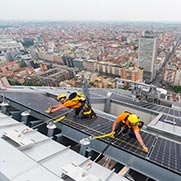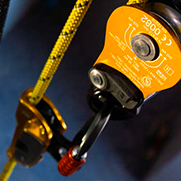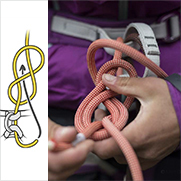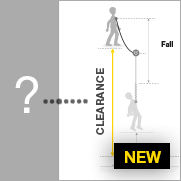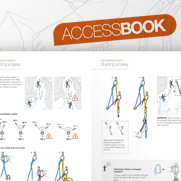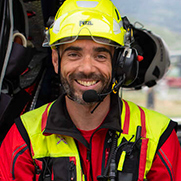Accompanied descent rescue with two people on one ZIGZAG
In case of an accident where the worker loses consciousness or is incapacitated, inert suspension in the harness is a life-threatening emergency requiring immediate action. The arborist must be capable of quickly evacuating an injured team-mate, without assistance. The goal of this document is not to cover rescue techniques that must be practiced at a training center. Only several precautions specific to the ZIGZAG are presented here.
Warnings
- Carefully read the Instructions for Use used in this technical advice before consulting the advice itself. You must have already read and understood the information in the Instructions for Use to be able to understand this supplementary information.
- Mastering these techniques requires specific training. Work with a professional to confirm your ability to perform these techniques safely and independently before attempting them unsupervised.
- We provide examples of techniques related to your activity. There may be others that we do not describe here.
Note: in this document the name ZIGZAG means either the ZIGZAG or ZIGZAG PLUS models.
Precautions
The ZIGZAG is designed for progression on rope by one person (up to 140 kg), either on doubled rope, or on a single rope with CHICANE. In the exceptional case of a rescue the ZIGZAG may be used for an accompanied descent, with the rescuer and the victim supported by a single device, with extra friction.
When the rescue situation allows it, it is preferable to use two separate systems for the victim and the rescuer, each on his own ZIGZAG, for example using the technique described in the chapter, Controlling the victim's ZIGZAG from a distance.
If the rescue situation requires a two-person descent on one ZIGZAG:
- Use an extra-friction system as described below.
- You must use gloves.
- Keep a hand on the brake side of the rope to improve control.
Remember: if you do not hold the brake side of the rope, any pressure on the release lever presents a fall risk.
- Beware of unlocking too suddenly and of jerkiness during the descent.
- Beware especially when approaching an obstacle or the ground.
- WARNING: in a descent from a great height, overheating and loss of control will be more pronounced.
Solutions for extra friction
An extra-friction system helps limit overheating of the ZIGZAG and considerably improves descent control with a heavy load. This also allows you to temporarily let go of the brake side of the rope to negotiate an obstacle or help position the victim.
- Extra friction with a RING L or RING OPEN
Warning: for clarity, only the ZIGZAG and extra friction are shown here. Other required elements such as a second attachment, or a system for positioning the victim, are not shown.
- Extra friction with minimal equipment, in case of difficulty during the descent
Warning: this technique should be considered only as an emergency measure in a dangerous situation; comfort is greatly reduced, with compression on the rescuer's ribs, and there is a high risk of wear on the harness straps.
Warning: for clarity, only the ZIGZAG and extra friction are shown here. Other required elements such as a second attachment, or a system for positioning the victim, are not shown.
Test results: descent with 200 kg on the ZIGZAG
Petzl did a series of tests on 20 m free-hanging descents. The tests were done using Yale XTC Pro 11.7 mm, Teufelberg Tachyon 11.5 mm, FTC Argiope 11.7 mm. The tests on doubled rope were done with a pulley at the redirect point (worst-case scenario for descent control), ZIGZAG installed normally on the harness, with extra friction. The tests on single rope were done with the CHICANE installed in accordance with the ZIGZAG Instructions for Use, with extra friction.
Test results
- Significant increase in ZIGZAG temperature, felt through the gloves.
- During the descent, speed control becomes increasingly less smooth; more attention is required when approaching the ground to avoid a rough landing.
- No locking problem was noted; it is the smoothness of descent control that degrades.
- The greater the mass, the faster the descent control degrades.
- The act of tensioning the brake-side rope contributes greatly to smooth unlocking.


